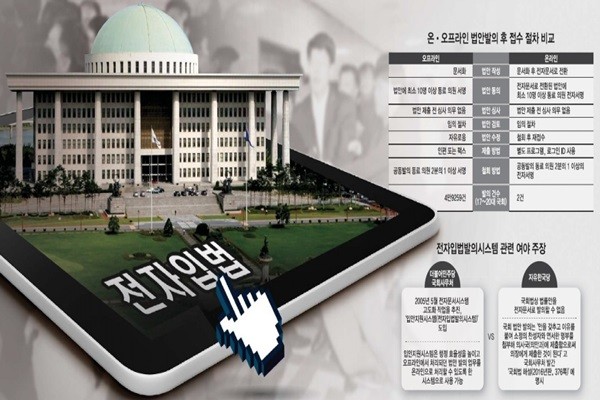‘Electronic legislation’ is drawing interests all of sudden within political circles. Electronic legislation indicates legislation being processed through an electronic system. It goes against traditional offline legislation method that has a paper document being submitted to National Assembly Secretariat (NAS) after receiving signatures from fellow members. Basically, legislation process will be handled online.
Although electronic legislation was introduced 14 years ago, it had been practically nonexistent. Although every industry is looking to change as it prepares to face the Fourth Industrial Revolution, National Assembly has stayed put.
Reason why electronic legislation has emerged as a hot topic within political circles recently is because ‘crowbar’ and ‘hammer’ have emerged within National Assembly ironically. Four parties and Liberty Korea Party confronted each other regarding designating fast-track process on Election Law and High-Ranking Officials Corruption Investigation Agency Act. When Liberty Korea Party closed off NAS’ Bill Department, The Minjoo Party of Korea utilized electronic legislation as its hidden card.
It was a historical moment when a bill was issued through an electronic system for the first time in South Korea’s constitution. It was also a moment when South Korea, which boasts itself as a powerhouse in IT industry, frankly showed its current political address. However, electronic legislation is drawing controversies as Liberty Korea Party filed a claim on adjudication on jurisdiction disputes to Constitutional Court this month.
◊Electronic legislation shows its face
NAS pushed for a process that will improve electronic document system to keep in step with participating government’s electronic government policy in May of 2005 and introduced ‘electronic legislation motion system’. Electronic legislation motion system is a system that improves efficiency of administration and processes legislation process, which used to take place offline, online.
It provides various functions such as request for a plan on a legislative bill, presentation of a bill, online signatures for agreement, and provision of information related to a bill.
Members of the National Assembly or advisors can access Electronic Document System, which is an internet site of the National Assembly, can log in through their IDs given by NAS and use electronic legislation motion system. If a process where signatures of at least ten members are inputted is finished, a bill will be motioned. Corresponding bill will be received by NAS’ Bill Department after going through authorization and official document delivery processes.
Although electronic legislation system was introduced during 17th National Assembly, it was not used once during 18th and 19th National Assembly. While South Korean Government and businesses were actively utilizing electronic documents when IT boom occurred in South Korea in early 2000s, it was not the case within the National Assembly.
However, electronic legislation system finally saw a light in the tunnel on the 26th of last month when Baek Hye-ryun, who is a member of the Democratic Party of Korea, and Chae Ih-bae, who is a member of Bareun Mirae Party, motioned revised High-Ranking Officials Corruption Investigation Agency Act and Criminal Procedure Law respectively through electronic legislation motion system. ‘Physical national assembly’ and ‘violent national assembly’, which had been chronic ills of the National Assembly, brought forth electronic legislation from a deep hibernation.
Electronic legislation system was used when Liberty Korea Party took over NAS’ Bill Department trying to block them from receiving bills through traditional offline way. Faxes inside of NAS’ Bill Department were also destroyed. Electronic legislation showed its face within an extreme confrontation situation. Baek Hae-ryun and her advisors attempted electronic legislation that was not used once before and succeeded after much meandering. She also informed her success to Chae Ih-bae which resulted in motioning of two bills through electronic legislation.
Although Liberty Korea Party opposed electronic legislation immediately, NAS stated that there was not any issue regarding electronic legislation. It explained that it would receive documents through information telecommunication network based on the National Assembly office management regulations.

◊Vitalization of electronic legislation stems from staying away from ‘empty formalities’
Although bills were received, controversies surrounding electronic legislation continued. Liberty Korea Party filed a claim on adjudication on jurisdiction disputes to Constitutional Court on the 7th of this month. It is stating that electronic legislation does not have basis within National Assembly Act or interpretations of National Assembly Act. “Some of the processes of receiving bills through electronic legislation motion system are illegal.” said Choi Kyo-il who is the head of Liberty Korea Party’s Legal Support Group. Electronic legislation system that was ignored by both parties headed to Constitutional Court within just 15 days from its first use.
Although opposing parties do not have different opinions towards the purpose of electronic legislation, electronic legislation system is being handled as an odd system as it coincides with political issues. While Liberty Korea Party states that there needs to be legal basis first to use electronic legislation system, Democratic Party of Korea states that inconvenient issues can be just fixed while using electronic legislation system.
If there are changes within the National Assembly and political circles, electronic legislation system can be used more widely in the future.
Unseen practices within the National Assembly had played a huge role having electronic legislation system being ignored by members of the National Assembly and their advisors. “Bills were received through political performance frequently as members of the National Assembly, who are the main agents of legislation, are politicians and are affiliated to parties.” said Professor Park Sang-chul of Kyonggi University. “Offline method had been preferred by members of the National Assembly more to show the process of bills being received by NAS’ Bill Department while putting out various catch phrases.”
It is important for the National Assembly to change first before South Korean Government focuses on the Fourth Industrial Revolution and innovative growth. “While increasing work efficiency through ICT-based electronic system, South Korean Government must provide information transparently to the public who are the voters.” said Professor Park.
Staff Reporter An, Youngguk | ang@etnews.com